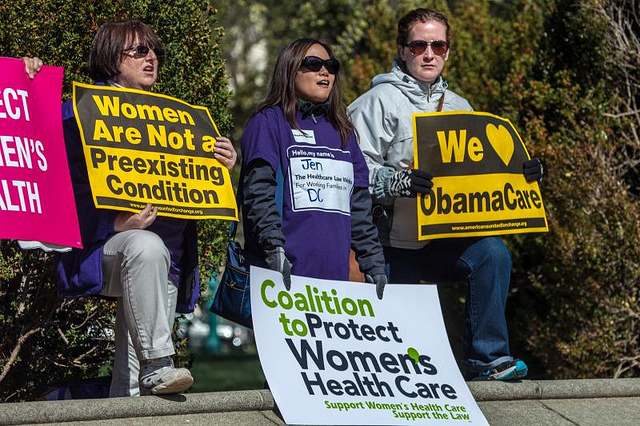Obamacare giveth, but courts could taketh away
Victoria Washington was between jobs and upset that the government was forcing her to buy health care or face penalties. She was also confused and frustrated by the process to enroll in a plan under Obamacare. So after reading and rereading the information on the troubled heathcare.gov website, she finally just settled on a plan offered by a well-known company, Total Health Care.
The 24-year-old University of Michigan graduate chose a plan this year that requires her to pay about $20 per month. She gets federal tax credits of about $150 per month to pay the rest of the premium.
Washington is one of about 250,000 Michigan residents who could see their health-care costs explode by more than 70 percent if a recent court ruling sets the stage for a repeal of Obamacare tax credits, according to a recent analysis of a government study. Nationwide, nearly 5 million people could see costs rise.
“I would have a problem with such a drastic increase,” Washington said.
Courts pick sides
Last week, two contradicting court decisions occurred within hours of each other, raising questions about future health-care costs for those enrolled in plans through the Affordable Care Act, commonly called Obamacare. In fact, this legal battle signals the biggest threat to date for President Barack Obama’s health care reform.
The question that the courts considered is whether the ACA allows federally operated exchanges such as the Michigan Health Insurance Marketplace (where people buy private health care plans) to offer consumers tax credits that reduce premiums and some other costs.
The U.S. Court of Appeals for the District of Columbia Circuit ruled July 22 that individuals purchasing insurance through an exchange established by a state are eligible for federal tax credits. But the law does not say anything about giving federal tax credits – or subsidies – to people who buy insurance through an exchange established by the federal government, for those states that refused to set up their own. Therefore those credits are not legal, the court ruled.
Only 14 states have set up exchanges, which could leave the subsidies for nearly 5 million people in 36 states who enrolled in a plan through the federal exchange up in the air.
A three-judge panel ruled 2 to 1 that when Congress passed the ACA, it did not explicitly allow tax credits for consumers on the federal health care exchange. The president is expected to ask the entire D.C. circuit court to rule on the case. If the full court does not reverse last week’s decision, the issue is expected to go to the U.S. Supreme Court in 2015.
Michigan Attorney General Bill Schuette, an opponent of the Affordable Care Act, joined the federal case in February, arguing that the law was poorly written and hurtful to residents, the state and businesses. The ACA requires employers to provide healthcare coverage, a huge point of contention. Also, many families that expected to keep their former coverage after the ACA passed lost it and had to buy insurance at higher costs.
After the ruling this week, Schuette's office called the ACA a “train wreck.”
“Once again, Michigan families are being hurt by Obamacare. They’ve faced higher premiums, losing their healthcare plan, they’re not able to choose their doctor, and now this,” Joy Yearout, a spokesman for Schuette, said in a written response. “Congress should repair this train wreck and get the IRS out of our healthcare system.”
In total opposition to the D.C. Circuit court decision, also on July 22, the U.S. Court of Appeals for the Fourth Circuit in Virginia found in favor of the Obama administration, ruling that the law is vague enough for the IRS to continue to interpret the tax credits offered to customers who buy a healthcare plan on the federal exchange as legal.
Big money on the line
Tax credits are the cornerstone of the ACA. Without the subsidies, by 2016 more than 7.3 million insurance consumers will miss out on $36.1 billion to help pay healthcare costs, according to a study from the Robert Wood Johnson Foundation.
In Michigan, more residents bought health-care plans on the exchange than expected. Rates and savings differ vastly in different regions of the state, but 87 percent of the estimated 250,000 Michiganders who signed up are getting tax credits to help pay 72 percent of the monthly insurance premium, on average. That’s an average subsidy of $246 per month to help pay for insurance.
If the tax credits go away, those premiums could increase by an average of 72 percent for those Michigan residents, according to a report from the U.S Department of Health and Human Services.
Marianne Udow-Phillips, director of the Center for Healthcare Research & Transformation, said while big money is on the line, Michigan enrollees should not panic about the DC Circuit court’s decision.
“Right now it doesn’t mean anything. The court did not order a stay, so the subsidies are still in effect. This still has a number of court steps to go through,” she said.
There’s a strong sentiment that this was a drafting error, and Congress intended for everyone on state and federal exchanges to be eligible for the tax credits, she said.
While the courts sort through what Congress intended, there are three possible – though very political – ways this issue could be resolved to retain the subsidies, Udow said.
Congress could fix the wording in the law to explicitly state that anyone who buys healthcare on a state or federal exchange can get the tax credit, although this is very unlikely, given the political acrimony over the law.
Or, the state legislature could pass a law to set up a state exchange in Michigan. Gov. Rick Snyder and the house of representatives supported creating a state exchange last year, but the state senate did not.
Finally, ACA supporters are researching whether there are administrative ways a federal exchange can become a state exchange without requiring a change to the law. The section of the ACA that establishes tax credits is not clear on what exactly constitutes a state or federal exchange, Udow-Phillips said. Is a state exchange solely a situation where a state is running the enrollment process or can a state contract with the federal government to do that?
“If this ruling prevails, it is likely that one thing the Obama administration will be considering is whether to create a clearer definition of what constitutes a state exchange,” she said.
Customer always right?
Washington, a Detroiter and U-M chemistry major who works temporary contract jobs as a product regulations technician, did not initially think it was fair that the ACA was forcing her – a healthy, single adult – to buy health insurance or face a penalty.
However, she has been able to use her new plan for checkups this year. And now she doesn’t want to ever live without benefits again.
“I do heavily rely on the subsidy. If I had to pay more, I would not opt for being completely uninsured, but I would probably not keep the same policy,” she said.
Sort of like a recall on a car, if the courts repeal Obamacare tax credits, the customers should not have to bear any costs because of the snafus.
“The consumers didn’t do anything wrong,” Washington said. “They shouldn’t place this on the consumer.”
See what new members are saying about why they donated to Bridge Michigan:
- “In order for this information to be accurate and unbiased it must be underwritten by its readers, not by special interests.” - Larry S.
- “Not many other media sources report on the topics Bridge does.” - Susan B.
- “Your journalism is outstanding and rare these days.” - Mark S.
If you want to ensure the future of nonpartisan, nonprofit Michigan journalism, please become a member today. You, too, will be asked why you donated and maybe we'll feature your quote next time!


 Conflicting court rulings endanger the subsidies many health-insurance customers rely on to make their payments.
Conflicting court rulings endanger the subsidies many health-insurance customers rely on to make their payments. Michigan Attorney General Bill Schuette
Michigan Attorney General Bill Schuette Marianne Udow-Phillips is the director of the Center for Healthcare Research & Transformation
Marianne Udow-Phillips is the director of the Center for Healthcare Research & Transformation